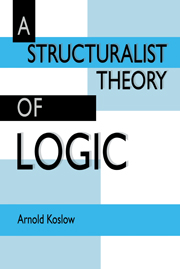Book contents
- Frontmatter
- Contents
- Preface
- Part I Background
- Part II Implication relations
- Part III The logical operators
- 11 Hypotheticals
- 12 Negations
- 13 Conjunctions
- 14 The disjunction operator
- 15 The logical operators parameterized
- 16 Further features of the operators
- 17 The dual of negation: Classical and nonclassical implication structures
- 18 The distinctness and relative power of the logical operators
- 19 Extensionality
- 20 Quantification
- 21 Identity
- 22 Special structures I: Logical operators on individuals: Mereology reconstituted
- 23 Special structures II: Interrogatives and implication relations
- 24 Completeness
- Part IV The modal operators
- Appendix A An implication relation for the integers in the programming language BASIC
- Appendix B Symmetric sequents as products of implication relations and their duals
- Appendix C Component-style logical operators and relevance
- Notes
- Bibliography
- Index
- Frontmatter
- Contents
- Preface
- Part I Background
- Part II Implication relations
- Part III The logical operators
- 11 Hypotheticals
- 12 Negations
- 13 Conjunctions
- 14 The disjunction operator
- 15 The logical operators parameterized
- 16 Further features of the operators
- 17 The dual of negation: Classical and nonclassical implication structures
- 18 The distinctness and relative power of the logical operators
- 19 Extensionality
- 20 Quantification
- 21 Identity
- 22 Special structures I: Logical operators on individuals: Mereology reconstituted
- 23 Special structures II: Interrogatives and implication relations
- 24 Completeness
- Part IV The modal operators
- Appendix A An implication relation for the integers in the programming language BASIC
- Appendix B Symmetric sequents as products of implication relations and their duals
- Appendix C Component-style logical operators and relevance
- Notes
- Bibliography
- Index
Summary
In the preceding chapter we introduced the notion of an extended implication structure 〈E, Pr, S, ⇒〉 in order to study predication. The idea was to show how an account of predicates could be developed within the framework that we adopted for the logical operators. Once an account of predicates was in place, we then characterized the universal and existential quantifiers within the same framework. Predicates, it will be recalled, were taken to be mappings of E* to S, where E* consists of all the infinite sequences of the members of E. The theory of quantification was developed without singling out any predicates in particular.
There is one particular predicate, however, that is worth isolating for further study. The identity predicate has traditionally been regarded as a special predicate of logical theory, although it has sometimes been questioned that it is properly part of “logic.” In any case, the identity relation or predicate usually is regarded as a predicate of two arguments that has a characteristic connection with the predicates of the structure under study. We shall see that in the characterization we give for it, it has strong affinities with the characterization of the other logical operators. And it will be shown how its reflexivity, symmetry, and transitivity follow from that characterization. There is, in addition, a traditional connection, due principally to Leibniz, between the identity of e and e′ and the sharing of all the one-argument predicates of a structure (those whose support has only one element).
- Type
- Chapter
- Information
- A Structuralist Theory of Logic , pp. 202 - 208Publisher: Cambridge University PressPrint publication year: 1992



